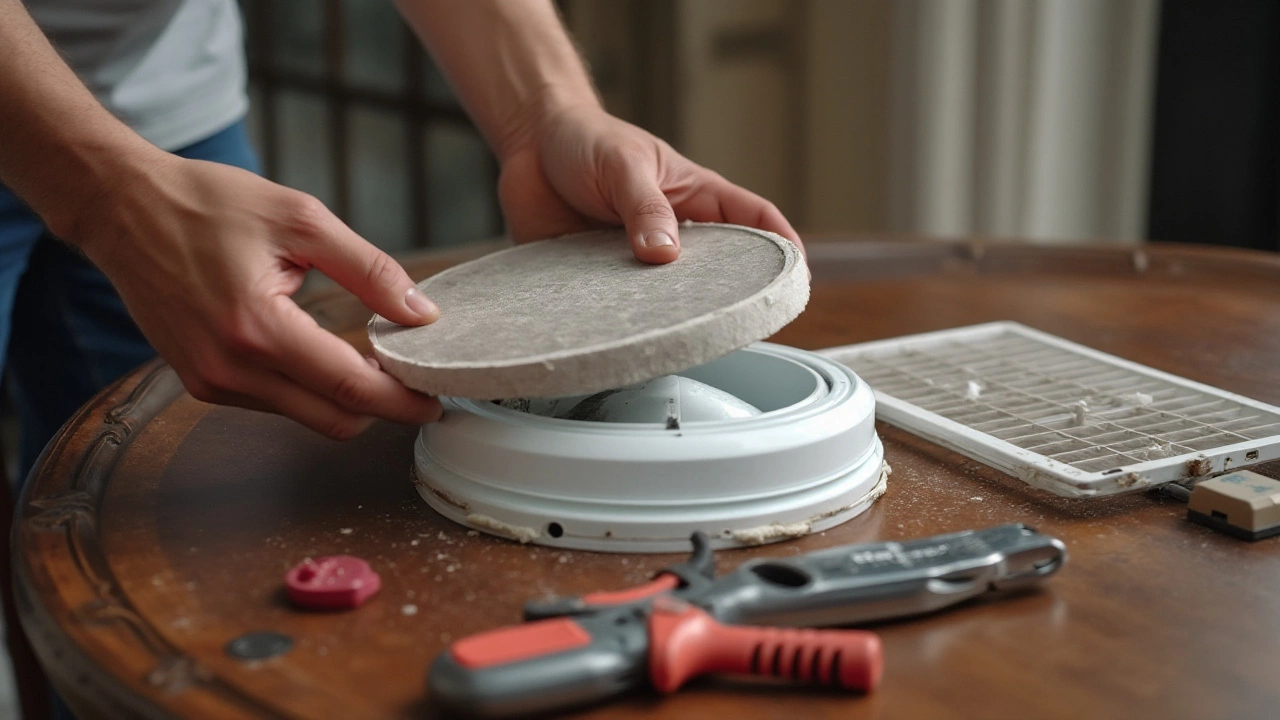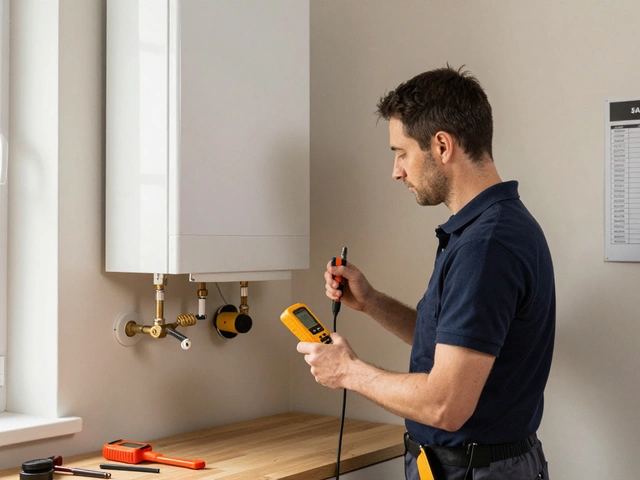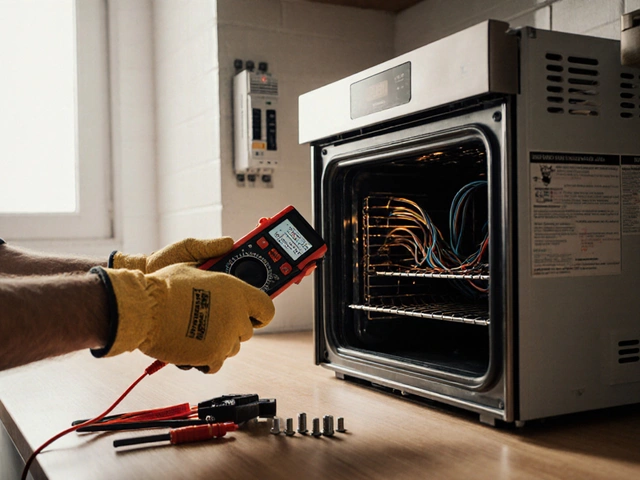If you've ever walked into your bathroom or kitchen and noticed the air feels a bit too still, chances are an extractor fan has gone on strike. Whether it's a sudden cessation in the soothing hum that keeps moisture at bay, or an outright refusal to power on, managing an uncooperative fan can be less daunting than it seems. These unsung heroes of home ventilation can indeed halt their hurried spin for numerous reasons, but many are easily resolved with a bit of careful attention.
Diving into the world of extractor fan repair reveals a blend of simple techniques and basic know-how. From minor wiring issues to clogged blades, the causes behind a standstill fan often lie in plain sight. With some systematic troubleshooting and a willingness to get your hands a little dirty, resurrecting your fan from its unexpected hiatus is well within reach. Along the way, you'll not only restore comfort to your living spaces but also extend the lifespan of your household's airflow management system.
- Common Causes of Fan Failure
- Diagnosing the Problem
- Repair and Maintenance Tips
- When to Call a Professional
Common Causes of Fan Failure
It can be particularly irksome when an extractor fan disappears into silence, leaving the atmosphere heavy and damp. Understanding the possible culprits behind this failure can be the first step towards a fix. Often, one of the most prevalent causes is a simple power issue. A tripped circuit breaker or a loose electrical connection can halt the fan's operation, disrupting its crucial role in air circulation. Corrosion from moisture exposure, especially in high humidity areas like bathrooms, can weaken the electrical connections and lead to a complete stop. Occasionally, the internal wiring may also suffer from wear over time or due to improper installation, necessitating a more thorough inspection.
Another frequent reason behind a non-operational fan can be motor burnout. Most fans operate via a motor that can become overworked over time, especially if tasked with handling heavy loads of moisture or continuous operation without breaks. Motors might overheat, leading them to falter permanently. Accumulated dust and debris can also instigate a blockage, restricting smooth blade rotation. Household fans, constantly filtering airborne particles, can amass significant grime over time, especially if they are not regularly cleaned. This buildup can impede functioning or damage components like fan blades, which can snap or warp due to persistent pressure.
Let's also consider age-induced wear and tear. Even with meticulous care, any mechanical device has a set lifespan, and extractor fans are no exception. Parts can degrade with time, explaining why an older model might exhibit erratic behavior or stop completely. Worn-out belts, bearings, or fan blades could all contribute to decreased efficiency or a complete halt. Often overlooked, control systems within the fan, such as faulty or worn switches, can interrupt electricity flow and result in an unexpected shutdown. Furthermore, thermostatic controls or humidistats, intended to regulate the fan based on environmental cues, might malfunction, causing erratic operation.
"Regular maintenance and timely interventions are key to avoiding unexpected breakdowns," advises the authors of the Home DIY and Maintenance Handbook. "Addressing issues early extends appliance lifespan significantly."
Intriguingly, incorrect installation from the beginning can haunt the device throughout its service life. Improperly fitted components can contribute to persistent operational challenges, while poor ventilation design might wreak havoc on a fan's intended function. Faulty installation can also intensify the stresses experienced by various components through everyday use, hastening their decline. It is vital to ensure devices are correctly installed and aligned to diminish long-term issues. On the flip side, using the wrong size fan or inappropriate type for the area could also lead to overwhelming stress upon the system, compromising its capability to work efficiently and thereby causing premature failure.

Diagnosing the Problem
It's a regular day, and your extractor fan, once a quiet knight defending against humidity and odors, has decided to defy its duty. Before you succumb to frustration, it's time to roll up your sleeves and play detective in the quest to diagnose the issue. The first order of business in this investigative journey involves understanding which components are most susceptible to failure and why. Often, a fan might stop working due to reasons so simple yet elusive, such as a tripped circuit breaker or a loose connection. Start by checking the electrical supply. Ensure the fan is getting power by confirming that the circuit breaker is on and the power outlet is functioning correctly. Sometimes, seemingly severe problems originate from something as trivial as accidentally flipped switches.
After confirming power, shift your focus to the fan's wiring connections. Over time, vibrations might lead to wires becoming loose. Thoroughly inspect the wiring for any disconnected leads or damage. Use a multimeter to test for continuity along the wires connected to the switch or plug. No result indicates an issue in the circuit that needs attention. When dealing with complex repairs, consulting an electrician is a wise idea to avoid potential hazards. If the wiring checks out, move on to examine the fan's internal components, such as the motor and blades. The motor might produce loud, unusual noises preceding a stop, signaling wear or internal damage.
The next step is to uncover potential obstructions. Dust, grease, and grime often create blockages, jamming the fan blades and impeding their rotation. Using a damp cloth, gently clean the fan blades and surrounding areas to ensure any such blockage is cleared. You will be surprised at how frequently cleanliness solves what appears to be more prominent troubles in extractor fan repair. In rare cases, the fan's stop might even be due to motor fatigue, necessitating a motor replacement.
"A well-maintained fan is akin to a well-tuned engine—silent yet powerful," advises John Hammel, a renowned HVAC specialist. Regular cleaning extends lifespan while minimizing noise, he adds.
Finally, ensure the fan is properly balanced. A well-balanced fan reduces vibration and consequent wear. Imbalance could occur if blades or mounting screws are misaligned, causing the fan to function erratically or halt. Although thorough, diagnosing a fan problem doesn't have to be intimidating. By applying logical, methodical thinking, you could successfully troubleshoot like a seasoned technician. These steps, grounded in common sense and precision, make it entirely possible for anyone to breathe life back into a still fan.

Repair and Maintenance Tips
Addressing issues with an extractor fan involves both meticulous troubleshooting and proactive maintenance. The first step is ensuring the fan's power supply is operational. Often, the issue could be as simple as a tripped circuit breaker or a blown fuse. Replacing a fuse is straightforward: locate the fuse box, switch off the main power, and replace the faulty fuse with one of the same amperage. Safety is paramount, so remember to follow all electrical safety precautions to avoid any mishaps.
Next on the list is checking the condition of the fan blades. Over time, dust and grease can accumulate, leading to imbalance or causing the motor to strain. To clean the blades, remove any visible grime using a soft brush or cloth without using abrasive cleaners, which can harm the finish or reduce the efficacy of the extractor. A well-maintained fan not only operates more efficiently but also uses less power, potentially saving you money on your electric bill.
If the blades and power supply are in order, inspect the wiring connections. Damaged or loose wires often lead to disruption in operation. Carefully removing the fan's cover lets you access the internal components, ensuring all connections are secure and intact. If you find frayed wires, it's time to replace them. Using the right gauge wire suited for your fan is crucial; referring to the manufacturer's manual can guide you on specifications. A little precaution here can prevent larger issues down the road.
"Regular maintenance can extend the lifespan of your extractor fan significantly," notes a study from the Home Appliance Safety Institute, highlighting the impact of proactive care on longevity.
Lubrication is another often overlooked but essential part of fan maintenance. The motor bearings need occasional lubrication to reduce friction and wear. Choosing the right kind of lubricant is essential—typically, light machine oil works well for fans. Applying just a few drops to the motor’s bearings can result in smoother and quieter operation. This simple step can make a significant difference in preventing costly repairs or replacements.
Finally, periodic checks and general inspections every 6-12 months keep your extractor fan running smoothly. Develop a checklist that covers the functional aspects mentioned above and tick off tasks as you complete them. The goal is not just to repair when things break, but to foresee potential wear and prevent failures. Incorporating these steps into your home maintenance routine ensures your extractor fan remains in top shape, keeping your indoor air quality fresh and healthy.

When to Call a Professional
Despite the satisfaction of solving a repair task on your own, there are moments when it’s imperative to reach out to a professional for your extractor fan repair. Safety is paramount, especially when dealing with electrical appliances that interact with the moisture-laden environments of kitchens and bathrooms. The risk of electrical shock or fire hazards should not be underestimated. A professional assessment is especially crucial if your fan’s failure involves complex electrical issues beyond the realm of simply replacing a fuse or reconnecting a loose wire.
If your fan exhibits signs of burnout, such as a burning odor or visibly scorched wires, it's time to seek expert help. These symptoms indicate potential motor failure or serious electrical faults that necessitate skills and tools that professionals possess. Continuous noises like grinding or screeching also suggest internal mechanical failure, possibly in the motor bearings or other key components. Attempting to fix these without the right expertise can lead to further damage or costly replacements.
Urgent Situations
The society we live in, sometimes led astray by a do-it-yourself culture, often might find itself tackling issues that should rightfully remain in the hands of licensed technicians. Certified professionals carry insights and specialized tools to handle problems that require dismantling or replacement of complex parts, safely and efficiently. If your fan is still under warranty, an attempt at self-repair could void the terms, leading to financial losses. Seeking professional assistance in these situations safeguards future claims and ensures your fan is restored under optimal conditions.
Professional Standards
The art of knowing when to call in the cavalry comes with recognizing the limits of personal expertise and appreciating the vast depth of a technician's professional training. In the words of industry expert James McAllister, “Knowing one's limits is the true first step in effective maintenance.”
Professionals not only resolve the issue at hand, but offer valuable preventative advice to avert future issues, preserving both the function and longevity of the extractor fan.Thus, investing in a professional service can often uncover underlying issues not readily apparent to the untrained eye, ensuring a comprehensive solution rather than a quick fix.
In light of such complexities, turning to professionals is not only wise but a sound investment in the overall health of your ventilation system. By prioritizing safety and valuing professional expertise, you ensure your fan continues to function reliably, suiting its fundamental purpose: maintaining a fresh and moisture-free atmosphere in your home.







